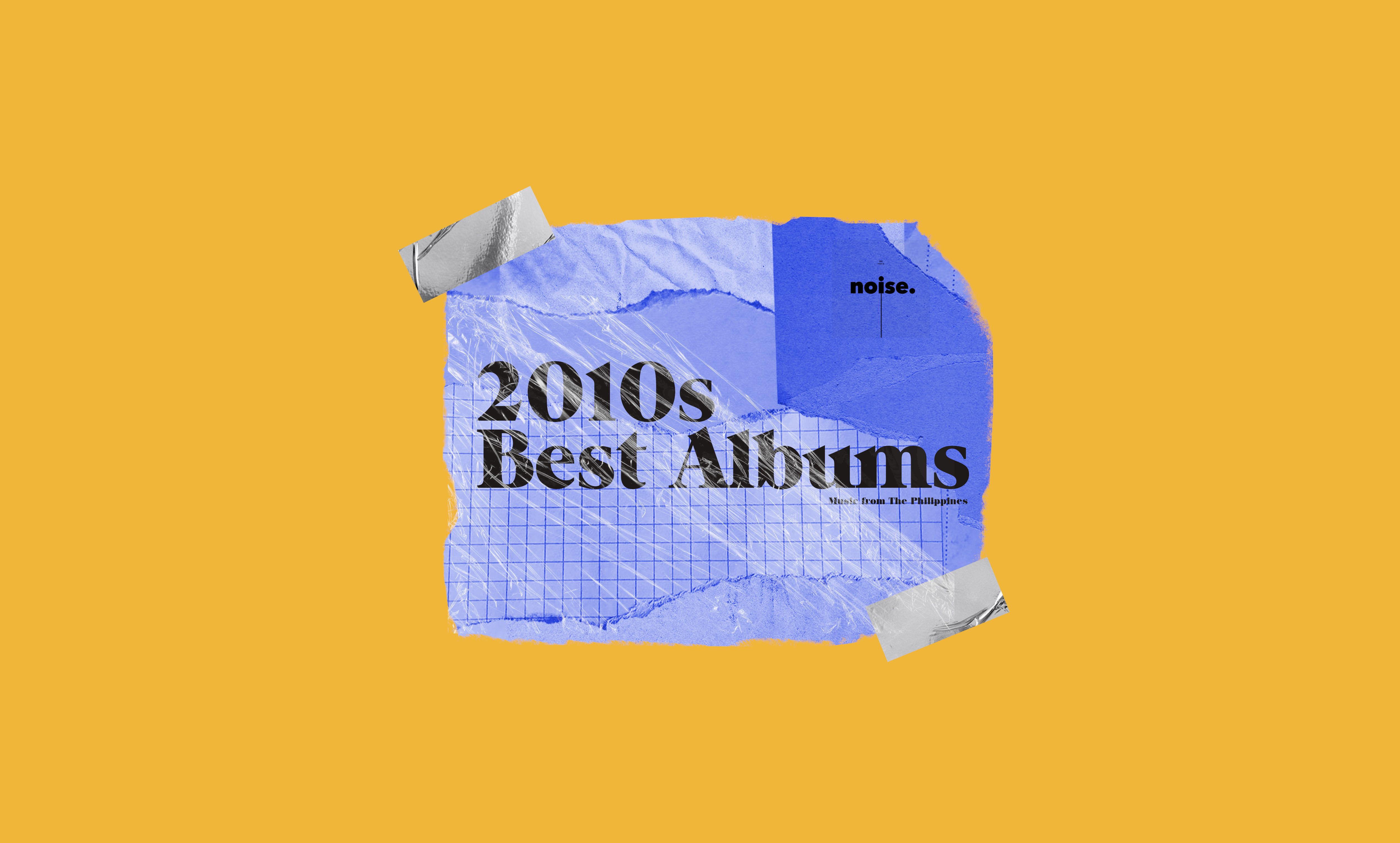BY MC GALANG AND IAN URRUTIA
2010s in music can be divided into two major developments: the streaming era and the landscape before it where people actually bought albums via digital downloads and physical releases. Both phases have churned out landmark albums that tackle socio-political issues with incisive songwriting, game-changing records that disrupt the normal with intriguing sonic possibilities, and personal favorites that transcend timelessness.
Here at The Rest Is Noise PH, we champion the last decade’s homegrown greats and longtime underdogs by writing short blurbs that indicate how they’ve found new ways to challenge musical sensibilities, regardless of genre and intent. Most of the releases in the list have impacted our lives on a personal level, probably because it wasn’t made solely for the purpose of entertainment. When the message hits hard, and you realize that the product is created to bring new life to the everyday mundane or to inspire people to stand up against the common enemy, there’s a sense of excitement in hoping that someone uninspired would give the record a chance, and learn something from it. That’s how powerful music is, and thus, the very reason why we continue to curate and put these finest discoveries in a pedestal.
Here are our personal picks for favorite local albums of the decade.
BY IAN URRUTIA
Tama Na Ang Drama
Ang Bandang Shirley (2012)
Those of us who grew up with Ang Bandang Shirley knew that life, even in its most complicated and loneliest moments, deserve to be celebrated. For most of the decade, their songs reflect the messy spectrum of our romantic and personal lives, sometimes to a devastating effect. But most of the time, it brings sunshine to cover most of the moroseness, even evolving to a nugget of wisdom to help us screw the pain away. Tama Na Ang Drama, the indie rock outfit’s sophomore album, operates on this level of life-affirming importance. To fans, it’s more than just a rulebook; the songs speak on an intimate level, the soaring guitars and sugar-coated noise transform anger, indifference and frustration into catharsis, and the lyrics mirror familiar experiences that you’d wish to go away or keep for as long as you can: a fading memory, an old Tumblr entry, or a piece of writing on the wall. Then you kept telling yourself repeatedly: “Mamaya na daw lumimot sa maalamat na pag-ibig,” to quote one of the lines in the self-titled track. Because love, in any form or weight, has always been immortalized in anthems. And when it’s revised to hold on tight to a specific narrative or when it’s given a new life as a rough draft, there’s a big chance that you’ll hear the same theme with a different perspective or an entirely new meaning. Tama Na Ang Drama works wonders with its mix of relatability and fundamental sense of otherness, but its indelibly memorable pop songs are sometimes conceived for what it is: art imitating life, and the only way to deal with it, is to close your eyes, sing the songs, and join the chorus. It’s a feeling worth losing to.
Capacities
UDD (2012)
After exploring a more sonically complex landscape filled with experiments and genre-hopping moments on Bipolar—the band’s sophomore album, UDD decided to keep things warm and intimate on the critically acclaimed third album, Capacities. With songs like “Luna,” “Parks,” “Indak,” “Feeling,” and “Thinker,” the Terno Recordings band sticks to writing subtle, melancholic pop songs that evoke the feeling of walking in the rain alone at midnight or watching the quiet skies fade by the hour—the visuals repeated in your brain like a loop, a very familiar one. There’s still a hint of eclecticism in the choice of song form and fillers: from the sparse electronic subtleties to the moody textures that characterize the song structure, from the extended clubby edit of “Night Drops” to the throbbing synths that open “Turn It Well.” It’s as if UDD wouldn’t be UDD without their unique ventures that turn confessionals into art-rock binges or an obscure ’80s song that no one knew about—and for music fans and critics who have been familiar with their work, these elements are what makes the quartet a dream team. It’s always about accessibility, but it’s also about breaking boundaries and surprising listeners with a new twist or vibe in every release. With Capacities, they seem to have embraced restraint and a quieter pace in sound. At its core, it’s an album that not only anoints them as masters of pop songcraft, but also consistent innovators who know how to rewrite the mundane into a sparkling, sprawling piece of gem.
Gatilyo
BLKD x UMPH (2015)
There’s no escaping the gospel of BLKD. Whether he preaches against class struggle or contractualization, Marcosian excesses, or corrupt government officials, the rapper-activist turns his attention to accessible storytelling – the language clear but incisively sharp, and the delivery prepared to stride past the obstacles and stand out in a battle of brevity and wit. In a decade of turbulent politics and distorted conflicts, it was a timely push for someone to fight for the underprivileged and discomforted, through protest songs disguised as catchy hip-hop anthems with top-notch production. This is where Gatilyo, BLKD’s debut full-length record, comes in.
The progressive album sets the stage for silent voices and hushed stories to be heard, rewriting history while soulfully dissecting modern Philippine society through the lens of someone who has struggled and immersed himself in impoverished urban and rural communities. This is an important cultural work that will stand the test of time, with its powerful voice and inherent ability to cut across generations. True to its core, Gatilyo promotes wider appreciation for bold, envelope-pushing Filipino hip-hop, speaking straight from a place of empathy and experience. For all its intents and purposes, to quote the great Bobby Balingit, it is also “the eyes, ears, and voice of our times.”
Haláng
The Purplechickens (2014)
Haláng sounds like it’s lifted from the Pinoy rock timeline of the late ‘70s to the early ‘00s. But instead of synthesizing the definitive moments of that era and coming up with a classic retelling, The Purplechickens built a cult legacy all of their own: a masterpiece that is both a lyrical powerhouse and a sonic blast, redefining the simple pleasures of a stripped-down jam somewhere out in the cold with unashamed tenderness or channeling the intense, unapologetic grind of The Jerks, Betrayed, or Wuds like they’re born to do it. Tapping into Aldus Santos and Marco Harder’s distinct songwriting genius, with the former brushing on the poignant, sometimes witty, but infinitely more eclectic style and the latter revealing a more anthemic punch, The Purplechickens’ acclaimed 2014 album, Haláng is loaded end-to-end with diverse musical ideas and inventive rock arrangements; but it’s made to be heard and felt live, shared with an intimate audience, before the lights dim, and you could no longer feel warmth. It’s that special. A listening experience worth having in a lifetime.
tilde~
similarobjects (2013)
It’s quite challenging to pick only one similarobjects album in a universe of deeply inspired, forward-thinking releases that either try to reinvigorate the formula with renewed sense of creativity or thread a singular vision that hasn’t been done in the sonic lab before. Finding Astral Lovers stands out in Jorge Wieneke’s prolific history of music-making for subverting the otherworldly and ethereal to recreate the pulse of humanly feelings, and then there’s tilde~—the follow-up full-length release that embraces the more ambient and abstract specimen of a dance record, while honoring the tradition with glitches distorted to unrecognizable pieces and melancholic feelings dominating the space as if it were yearning for attention, for a place in history. Tilde~, “a play on approximates, uncertainty and a sense of not knowing,” offers moments of quiet reprieve for the wandering soul, but it also keeps your shoes glued for the lonely hour, coaxing you to dance and revel in the cosmos until you can no longer feel anything but the world spinning, waiting for the light to come back and knock some sense into people’s lives.
USISA
Bullet Dumas (2018)
Bullet Dumas has always maintained an uncompromising level of artistry that doesn’t belong to a specific category or cluster. Devoid of straightforwardness and simplicity, his work often defies the logic of a structure or form, often ascending to some transcendent place in terms of lyrical design and musical production. But despite the theatricality, the eclectic bigness that comes with every turn of the phrase, and the electric madness that characterizes his sonic blueprint, Dumas has captured an essentially low-key persona that values the history of folk music in the Philippines: its alternative function as a language of protest and resistance, and its urgency to articulate a particular mood, moment, and time with the gift of stripped-down intimacy and a voice wailing to the heavens. USISA thrives in this special place, a proof of Bullet’s ability to weave the everyday journey into larger-than-life narratives. Here, he collaborates with a bunch of professional musicians on complex arrangements that almost feel elemental rather than orchestral; and instead of the usual singer-songwriter mold, he goes for ethereal chants, extended outros, and various forms of disruption to break scales and move mountains. But outside of the ornate qualities, storytelling is front and center on USISA, and that’s where you can almost taste the subtle bitterness or feel the joy wrap your skin, and find a personal connection in a way that is raw, heartfelt, and honest. He writes with specifity and warmth, where rhythm and verses collide to build the backstory of a particular character or destroy your notion of what qualifies as love or illusion or both. That itself is a colossal achievement for a kind of record that knows no boundaries, that speaks straight to the soul. It’s closer to a gospel for what it’s worth.
Out of the Floodways and Into Your Homes
Identikit (2013)
While not anywhere near revolutionary, Identikit’s Out of the Floodways and Into Your Homes exhibits a surprising level of versatility that immediately captures your attention. There’s pretty much everything here for everyone: “Peach,” a song about being broken and in denial, takes listeners behind closed doors with its saccharine indie pop verses, bossa nova backbeat, and a sentiment that questions everything: from a familiar breakup scene in the movie to an old advice from a friend. The torturing mental note recedes into a haze three minutes after; the complications dissolve in a swell of shoegaze noise and distorted feedback, while we just let the harsh feelings drown and get carried away into oblivion. And then there’s the haunted ballad “Dysfunctional,” which takes its cues from the dreamy and expansive atmospherics of Cocteau Twins and This Mortal Coil, and the summery, indie rock anthems “Me and My Japanese Bike” and “Tiny Fractures” showing how much they’ve grown musically, and where Identikit expertly balances sweet, melodic hooks with fuzz. It’s impressive how Identikit managed to sound natural and effortless with songs that would either make or break you. Out of the Floodways and Into Your Homes is definitely a rewarding listen, a work of a savvy artist that makes use of opposing sounds to disrupt conventions.
Primate
Tarsius (2011)
More than ten years in the game, Tarsius has cultivated a recognizable blueprint for electronic music that is made for both the clubs and the bedroom. There’s nothing conventional about the aesthetic diversity of their body of work. In fact, their debut album, Primate, draws from the most obscure sources, exploring bodily connections with earth energies, ambient soundscapes and live drums. The ten-track release from Numberline Records taps into an impressive range of collages and shapes, but when it comes to the overall vision, the electronic music duo retains a trippy, late-night feel to their songs. For a solid banger that takes you to an eruption of ecstasy and delight, listen to “Deathless Gods.” If you want to go beyond the riotous and mad, grab some cocktails in the form of “Cosmic Convergence,” “Anarchy In Ukay” and “Chosen Few.” These jams reward repeated casual listening.
Ouevre
Bombo Pluto Ova (2015)
For the last decade alone, Bomba Pluto Ova has produced three full-length albums under Bomba Press—an achievement in itself, especially for an experimental band whose music is defined by expansive soundscapes, free-form builds, and noise-inflected epics. 2012’s Phantom saw the band deconstruct symphonic pieces into brooding scores, branching out beyond the radical fury for something more primitive, something closer to tradition. Then there’s 2014’s Aorta: a noise-rock opus that dabbles into more accessible rhythms and cathartic peaks. But nothing beats 2015’s Ouevre, probably the Cebu-based band’s finest among the bunch. It presents an intriguing possibility of how noise, no-wave, black metal, drone, free jazz, experimental music, post-rock and ambient sounds can work together to create a massive record that feels exceedingly communal yet personal. With sci-fi themes that explore both beauty and madness, this long-form genius might seem bleak on surface, but if you just mine its enormous amount of energy and vibe, you’ll discover that there’s so much to learn about the band’s aesthetic discipline, technical chops, and artistic range.
Residuals
Tiger Pussy (2017)
“It’s the sound of angry women torching the rock n’ roll establishment with all their might,” yes, I wrote that three years ago in my review of Tiger Pussy’s Residuals—a record that’s far from subtle and spotless, but keeps expanding the legacy of its predecessor album, People You Hate—released in 2013 with more bigger wins: from leading the feminist movement in contemporary punk rock for years, without much fanfare and Western media coverage, to opening the floodgates for women in rock music circa 2010s to express themselves freely, own the stage triumphantly, and inspire both young women and queers to start their own punk band. More than anything, Residuals is a rock album that’s ready to wreak havoc responsibly, with menacing guitar riffs, commanding presence, and visceral energy marking a palpable shift from drunken to assertive, sexually confident to aggressive. Like the parties they hold on stage during live performances, the songs on Residuals either ignites the movement or causes a riot—both are fun anyways, and inclusive too.
BY MC GALANG
Musical O
Musical O (2017)
Musical O’s excellent sophomore self-titled album is a collection of great, deeply intimate stories that somehow are able to articulate indescribable feelings that are uncommonly original. Listening to it brings me a great sense of peace and resolve, the manner in which the band—whose debut album Debutante (2009) confronts conflicts with more forceful, youthful vigor—exerts a seasoned tenacity, especially during its more tender moments of reflection.
Phrases like “quiet and clever” and “not dead, but not living,” are striking in their simplicity, complex in their brevity. These are some of the most memorable songwriting I’ve come across with since Up Dharma Down’s sand and the sea, meet in between, fire and ice, you and I in “We Give In Sometimes.” This is the kind of cultivated wisdom found in relinquishing control and finding purpose or meaning amidst nothingness.
Foreign Languages
tide/edit (2014)
Foreign Languages is a work marked with impassioned sensitivity, a trait hard to divorce from tide/edit’s discography as a whole. It sounds like it was made with a pervasive concern and regard for other beings: How are you doing? What can I do for you? I am here for you.
This is an album where connection takes precedent before anything else, and that it reminds us that we are stewards of one another. The band’s ethos is a reinforcement of kindness not as a form of required civic duty but an act of humanity, a sense of unity—that our similarities are more than the sum of our differences.
Great Secret Show
Sleepwalk Circus (2010)
Sleepwalk Circus’s Great Secret Show is many things; sometimes, everything at once. It sounds both free and yearning. It is not bound by time or place; it is everywhere, all the time. It is an ocean: it gives and takes, it swells at storm and even in its most quiet, is never truly still. It resembles a dream: sometimes lucid, at times unstructured. It stretches the boundaries of surrealism—breathtaking, devastating, incongruous. It is “a place that seems always vaguely familiar.”
Ballroom Dancing
Wilderness (2017)
There is nothing that captures a rambunctious people ready to commit civil disobedience than that of Ballroom Dancing, an album that screams and is colored with Filipino sensibilities. It is loud and commanding. It is unrest manifesting itself in a cacophony of sounds and sights. It is what I need to be playing as we storm the streets, demanding the heads of pigs in the government. It is a never-ending gathering, a never-ending movement, a never-ending burning.
Grandma
UNIQUE (2018)
There’s poetic, there’s prosaic, and then there’s Unique. His debut album, Grandma, is a masterful commentary on society’s ills, forgetfulness, and erasure of history. It offers sharp, incisive criticisms and evaluations of our character, including his.
But I think it’s genius—and heart—lies in its openness. This is a record that has reached its audience organically. It is accessible not because it’s palatable, but because it is unnerving in its honesty, its “soul-rousing power” (Walt Whitman).
THE "LAST PIECE OF WILDERNESS"
Last year, a Slovenian fan named Peter asked Nick Cave a question: Considering human imagination the last piece of wilderness, do you think AI will ever be able to write a good song?
It is perfectly conceivable that AI could produce a song as good as Nirvana’s Smells Like Teen Spirit, for example, and that it ticked all the boxes required to make us feel what a song like that should make us feel – in this case, excited and rebellious, let’s say. It is also feasible that AI could produce a song that makes us feel these same feelings, but more intensely than any human songwriter could do.
But, I don’t feel that when we listen to Smells Like Teen Spiritit is only the song that we are listening to. It feels to me, that what we are actually listening to is a withdrawn and alienated young man’s journey out of the small American town of Aberdeen – a young man who by any measure was a walking bundle of dysfunction and human limitation – a young man who had the temerity to howl his particular pain into a microphone and in doing so, by way of the heavens, reach into the hearts of a generation. We are also listening to Iggy Pop walk across his audience’s hands and smear himself in peanut butter whilst singing 1970. We are listening to Beethoven compose the Ninth Symphony while almost totally deaf. We are listening to Prince, that tiny cluster of purple atoms, singing in the pouring rain at the Super Bowl and blowing everyone’s minds. We are listening to Nina Simone stuff all her rage and disappointment into the most tender of love songs. We are listening to Paganini continue to play his Stradivarius as the strings snapped. We are listening to Jimi Hendrix kneel and set fire to his own instrument.
What we are actually listening to is human limitation and the audacity to transcend it. Artificial Intelligence, for all its unlimited potential, simply doesn’t have this capacity. How could it? And this is the essence of transcendence. If we have limitless potential then what is there to transcend? And therefore what is the purpose of the imagination at all. Music has the ability to touch the celestial sphere with the tips of its fingers and the awe and wonder we feel is in the desperate temerity of the reach, not just the outcome. Where is the transcendent splendour in unlimited potential? So to answer your question, Peter, AI would have the capacity to write a good song, but not a great one. It lacks the nerve.






